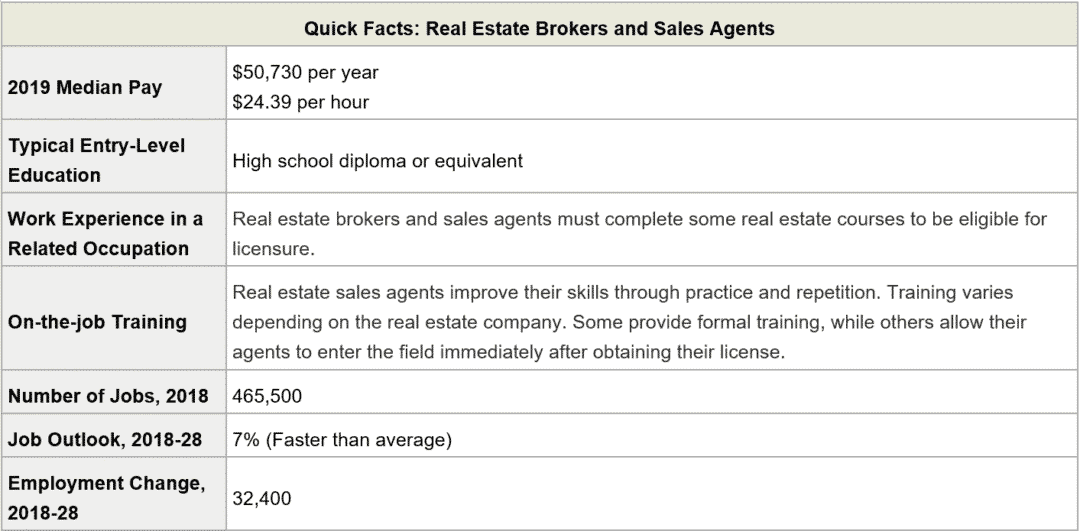Learn about trends affecting the Real Estate industry and find out more information about how to open your own real estate business. Don’t forget you can receive free or low-cost training and free professional business advice, from your local Small Business Development Center!
Get a free Real Estate business plan template on our Business Plans page.
Real Estate Business COVID-19 Resources
In response to the global COVID-19 pandemic, shelter-in-place orders and physical distancing measures affected many businesses; here is a look at the impact to the Real Estate business industry. Suggested practices to stay at home or avoid nonessential activities have led to consumers engaging in less real estate showings. Nationwide job losses have also caused consumers to delay or cancel plans for large purchases such as real estate. However, currently low interest rates have moderated some of the negative impact of the outbreak.
- SBDCNet’s COVID-19 Small Business Resources
- SBDCNet’s COVID-19 Industry Resources
- Coronavirus: A Guide for Realtors
- NAHB: Coronavirus Preparedness
- CCIM: Coronavirus Impact on Commercial Real Estate
Real Estate Business Overview & Trends
NAICS Code: 53111, 53121 & 531311 and SIC Code: 6513, 6514 & 6531
This Residential Real Estate Brokerage & Management Industry market research excerpt is from First Research which also sells a full version of this report.
“Companies in this industry act as agents or brokers in the buying and selling of residential real estate, in addition to leasing and managing residential properties. Major companies include Keller Williams, HomeServices of America, Realogy, and Re/Max (all based in the US), as well as Countrywide Group (UK), Deutsche Wohnen (Germany), FirstService (Canada), and Leopalace21 (Japan).
The world’s top-performing residential real estate markets, where home values are rising the fastest, include Hong Kong, Slovenia, Hungary, Turkey, and Mexico, according to Knight Frank’s Global House Price Index. Housing prices are mirroring the upturn in the global economy.
The US residential real estate brokerage and management industry includes about 230,000 establishments (single-location companies and units of multi-location companies) with combined annual revenue of about $200 billion.
Competitive Landscape: Demand is driven by population growth and construction activity. The profitability of residential real estate brokerage and management companies depends on demand for properties and the volume of transactions they handle. Demand and volume are usually higher during periods of strong economic growth and can be negatively impacted by a recession or too much new construction. Large companies have only modest economies of scale and benefit mainly from better name recognition than smaller rivals. Small companies compete effectively by developing expertise in a single market or region. The US industry is fragmented: the 50 largest companies account for about 25% of revenue.”
This Real Estate business market research report summary is from Euromonitor, which also sells a full version of this report.
Housing prices: Housing prices are projected to continue to climb due to the economy, population growth and finite inventory. Although as the Federal Reserve adjusts interest rates, it is expected to slow.
Retail Changes Commercial: The retail landscape continues to evolve as technology and consumer trends will continue to impact the commercial environment.
Real Estate Sales & Brokerage Customer Demographics
IBISWorld reports on the major market segments for Real Estate Sales & Brokerage in the US. The full version of the report is available for purchase.
- The Real Estate Sales & Brokerage industry generates approximately $160.6 billion
- The major markets are segmented by commercial & residential properties in the following order:
- Residential sales and rentals (74.3%)
- Commercial rentals and sales (16.9%)
- Non sale services (8.8%)
Real Estate Business Startup Costs
Commercial Real Estate Agent from Entrepreneur
- Startup Costs: $10,000 – $50,000
- Home Based: Can be operated from home.
- Franchises Available? Yes
Costs to Consider when Starting a Real Estate Career
Real Estate Expenses to Expect
Real Estate Business Plans
- Real Estate Brokerage Business Plan
- Real Estate Agency Business Plan
- Real Estate Brokerage Business Plan
Real Estate Business Publications & Resources
- Realtor Magazine
- Realty Times
- National Mortgage Professional Magazine
- The Mortgage Reports
- Top Agent
- National Real Estate Investor
- GlobeSt. National
- Inman
- Joint Center for Housing Studies
Real Estate Industry Associations
Trade associations often are excellent sources of information on an industry. Here are some relevant industry associations:
- National Association of Realtors
- Society of Industrial and Office Realtors
- International Council of Shopping Centers
- National Homebuilder Association
- Realtors Land Institute
- CCIM Institute
Real Estate Employment Trends
Information is an important factor for real estate professionals. Here is a real estate agent labor market summary from the Bureau of Labor Statistics focused on Real Estate Brokers and Sales Agents Market Conditions

“Work Environment
Workplace size for real estate brokers and sales agents can range from a one-person business to a large firm with numerous branch offices. Many brokers have franchise agreements with national or regional real estate companies. Under this arrangement, the broker pays a fee to be affiliated with a widely known real estate organization.
Some real estate brokers and sales agents work in a typical office environment, while others work out of their homes. In both cases, real estate workers spend much of their time away from their desks, showing properties to customers, traveling to see properties for sale, and meeting with prospective clients.
Pay
Brokers and sales agents earn most of their income from commissions on sales. The commission varies by the type of property and its value. Commissions often are divided among the buying agent, selling agent, brokers, and firms.
An agent’s income often depends on economic conditions, the agent’s individual motivation, and the types of property available. Income usually increases as agents become better and more experienced at sales. Earnings can be irregular, especially for beginners, and agents sometimes go weeks or months without a sale. Some agents become active in community organizations and local real estate organizations to broaden their contacts and increase their sales.
Job Outlook
The millennial generation will be entering the prime working-age and household-forming age cohort over the next decade. This generation has delayed home ownership because of financial and personal considerations. Therefore, their entry into the housing market should increase demand for real estate agents and brokers.
An improving job market and rising consumer spending also will drive demand for brokers and agents to handle commercial, retail, and industrial real estate transactions.
However, tighter credit regulations and increasing real estate prices may cause some people to continue renting as opposed to entering the housing market.
The real estate market is highly sensitive to fluctuations in the economy, and employment of real estate brokers and agents will vary accordingly. In periods of economic growth or stability, employment should grow to accommodate people looking to buy homes and businesses looking to expand office or retail space. Alternatively, during periods of declining economic activity or rising interest rates, the amount of work for brokers and agents will slow and employment may decline.
A more specific breakdown of wages for Real Estate and Rental and Leasing businesses in the US can be found here (see 41-9021 & 41-9022).”
Additional Resources
Already in business or thinking about starting your own small business? Check out our various small business resources:
- View more business reports here: Small Business Snapshots
- View small business help topics here: Small Business Information Center
- View industry-specific research here: Market Research Links
- View business plans samples here: Sample Business Plans
Remember, you can also receive free professional business advice and free or low-cost business training from your local Small Business Development Center!
Photo credit: Matt Donders on Unsplash






